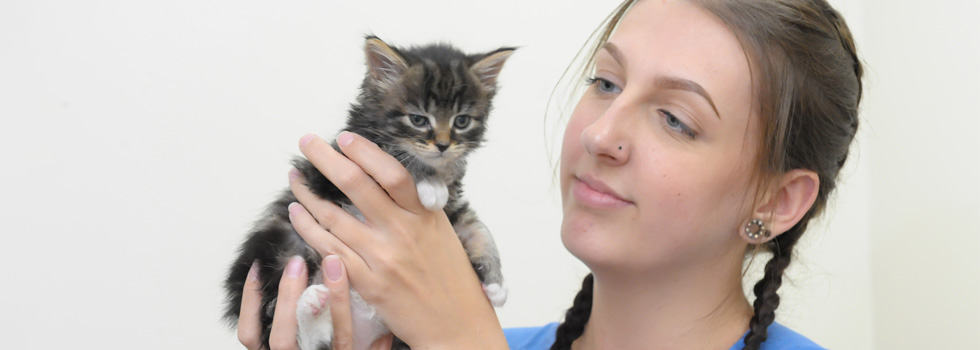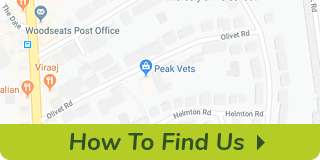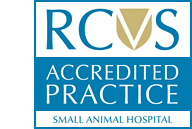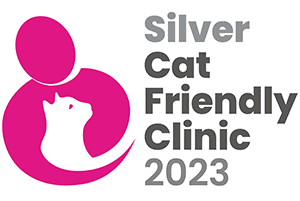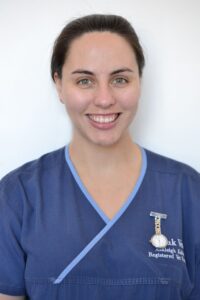 Ashleigh Kubie is one of our Registered Veterinary Nurses and Clinical Coaches. She has kindly taken the time out to tell us about the life of a Vet Nurse.
Ashleigh Kubie is one of our Registered Veterinary Nurses and Clinical Coaches. She has kindly taken the time out to tell us about the life of a Vet Nurse.
How long have you been a Vet Nurse and what route did you follow to qualify?
I have been qualified just under five years, but I started my nurse training nine years ago, so have been in practice longer with work experience. The Degree route was the career path I chose, and this involved four years of training at University; I applied through UCAS at college. Prior to getting into University, I completed my BTEC National Diploma in Animal Management to get onto the Veterinary Nursing course. I went to the University of Central Lancashire and completed my BSc (Hons) in Veterinary Nursing Degree.
What attracted you to the career as a Veterinary Nurse?
I grew up in Zimbabwe, so was very fortunate to be surrounded by wild animals and was able to bottle feed lions at a very young age. My passion for science, however, started when I watched my first animal dissection on a Zebra. I found it fascinating learning how the body worked; this initiated my scientific background desire. Like many Vet Nurses, I used to enjoy playing with my dogs as a child and pretending to nurse them back to health, my passion for animals grew from there, leading me to where I am today.
What does your job entail?
My daily routine varies with my rota and includes:
Operations
These are days where I help the Vet with the days’ surgical procedures. This usually involves sterile preparation of the animal before surgery and assisting the vet whilst they anaesthetise patients and later monitor their anaesthetics. I also position patients for x-rays and give local anaesthetic nerve blocks for dentals, to provide better analgesia. Finally, if required, I can “scrub in” and assist with surgical procedures.
Inpatients
This involves administering medications and monitoring sick animals, creating nutritional diet plans to feed these ill patients and providing all of their nursing care. We pride ourselves in our holistic approach to patient care such as grooming and socialising with sick animals to help them feel more comfortable. For example, we provide pheromone and music therapy to help reduce stress and anxiety whilst in the dog and cat wards. I also take blood samples, place intravenous catheters and perform laboratory tests.
On-call
An on-call shift is 24 hours on weekdays and 72 hours at weekends and is shared on a rota basis. While on call, I assist the vet with any emergency cases they have “out of hours”.
Nurse clinics
My favourite part of the job is running our nurse clinics, where I educate clients on a range of different topics
- Weight Management Programs
- Dental Health Checks
- Puppy and Kitten Health Checks
- Second vaccinations
- Implanting microchips
- Expressing anal glands
- Clipping nails
- Administration of medications
- Bandage changes and wound care
- “Meet and Greets”
- Nutritional advice
Puppy Socialisation Classes
A great opportunity to educate clients about their new animal. giving them the best start in life. This includes teaching them about socialisation, husbandry and preventative medicines.
Clinical Coach
One to one training with a student nurse that I mentor. This includes practical assistance with their Nursing Progress Log (NPL), an important requirement for the veterinary nursing course.
Reception
Front of house works involves answering telephone calls, triaging patients over the phone and in practice, and general administrative tasks such as taking payments and booking appointments.
What is the most rewarding thing about being a Vet Nurse?
This differs for everyone. I personally love creating that special bond with a nervous patient where they are able to learn to trust me and as our relationship changes over time, they start to actively seek comfort from me, reinforcing that level of trust. In most cases, I love dealing with the nervous aggression dogs and teaching them that there is nothing to be afraid of, the bigger the dog the better.
What sort of attributes do you need to be a good Vet Nurse?
Patience is very important, a lot of our patients need that extra TLC and patience is valuable when trying to encourage a patient to start eating; animals pick up on our emotions and if you are feeling rushed, they will sense it. A positive attitude goes a long way, the job can be very stressful and staying positive can help your colleagues in tough times. Normal attributes such as timekeeping, team player etc apply as well.
What advice would you give someone that is thinking about a career as a Vet Nurse?
I would advise getting as much work experience as possible. It is not a glamourous job and I see lots of work experience people who don’t fully appreciate what the job is about. Have a look into the different pathways, whether that be Degree route or the Apprenticeship route; you may find one more suitable to your lifestyle. Be prepared to do the work, there is a lot of studying and coursework. If you are unsure what the job entails, contact your local vets and ask for a nurse to speak to you about the role.
What are the best things about working at Peak Vets?
The most important thing to me is that it is a family atmosphere. This is so important, as we spend the majority of our time together compared to homelife. We have built unbreakable bonds, and this makes our job that little bit better. I love the fact that Nurse Clinics are encouraged, and we do a variety of shifts meaning that all our nursing techniques are used.
Our Vets are very supportive and encourage us to learn new skills as well as allowing us to train and perform these. Continuous Professional Development (CPD) is paid for and encouraged which allows us to take on additional qualifications. Our Clinical Directors always try to provide us with the best equipment possible, therefore allowing us to improve our diagnostic and treatment options.
What would be your career highlight so far?
I think completing my Vets Now Emergency and Critical Care Certificate (ECC) as well as finishing my Degree with Honours. Completing my ECC course, has allowed me to progress in my career allowing me to do additional tasks with my vets such as Dental Nerve Blocks. In all honestly, I enjoy doing a variety of things that increase my job satisfaction, they can be as simple as taking blood samples and placing intravenous catheters.
Have you completed any additional training to support you in your role?
Yes, I have completed a Vets Now Emergency and Critical Care Certificate which took an additional 18 months to complete. This has given me a wealth of knowledge on different techniques and nursing protocols. I have also done smaller training, such as becoming a Pet Health Counsellor and attending several weight clinic CPD courses to help with my Weight Clinic Programs. I have also completed my Clinical Coach training, so that I am able to train student nurses, providing practical skills as well as sharing knowledge.
What’s the next step in your career pathway?
At the moment, I have completed everything in my ‘Five Year Plan’. I would like to do additional Nurse Clinic training and eventually do a Nutritional Certificate, as I feel this will further my knowledge and strengthen my weight clinic programs.
Thank you, Ashleigh, for sharing your story.
To find out more about the role of RVNs in veterinary practice, or if you are interested in finding out more about a career in veterinary nursing, visit the BVNA website at www.bvna.org.uk/a-career-in-veterinary-nursing/a-career-in-veterinary-nursing.

